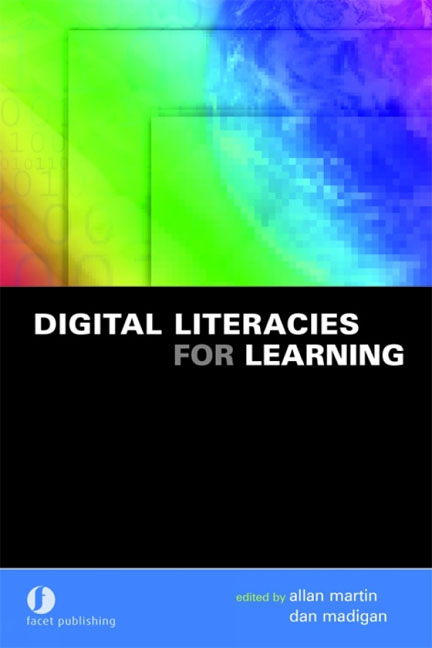Book contents
- Frontmatter
- Contents
- Dedication
- The contributors
- Foreword
- Preface
- Part I Literacies in the digital age
- 1 Literacies for the digital age: preview of Part 1
- 2 Learners, learning literacy and the pedagogy of e-learning
- 3 Real learning in virtual environments
- 4 Digital fusion: defining the intersection of content and communications
- 5 Literacy and the digital knowledge revolution
- 6 Understanding e-literacy
- 7 Information literacy – an overview
- 8 Contemporary literacy – the three Es
- 9 Reconceptualizing media literacy for the digital age
- 10 Literacy, e-literacy and multiliteracies: meeting the challenges of teaching online
- 11 Graduate e-literacies and employability
- Part II Enabling and supporting digital literacies
- Index
3 - Real learning in virtual environments
from Part I - Literacies in the digital age
Published online by Cambridge University Press: 08 June 2018
- Frontmatter
- Contents
- Dedication
- The contributors
- Foreword
- Preface
- Part I Literacies in the digital age
- 1 Literacies for the digital age: preview of Part 1
- 2 Learners, learning literacy and the pedagogy of e-learning
- 3 Real learning in virtual environments
- 4 Digital fusion: defining the intersection of content and communications
- 5 Literacy and the digital knowledge revolution
- 6 Understanding e-literacy
- 7 Information literacy – an overview
- 8 Contemporary literacy – the three Es
- 9 Reconceptualizing media literacy for the digital age
- 10 Literacy, e-literacy and multiliteracies: meeting the challenges of teaching online
- 11 Graduate e-literacies and employability
- Part II Enabling and supporting digital literacies
- Index
Summary
Abstract
Virtual learning environments mirror their physical counterparts in many ways, using metaphorical representations to enable students to understand the interface. Digital campuses share the architectural features exhibited by physical institutions: an entrance, administration block, lecture halls, library, ancillary services and recreation areas. Lectures are replaced by learning tasks that require learners to interact, promoting a feeling of community. Co-operative learning allows us to compensate for the absence of interactivity in web-based learning. While computer literacy is taken for granted, students in digital learning environments require three specific literacies: visual, co-operative and academic literacy.
Introduction
E-learning courses show a distinct advantage over conventional distance education because in a digital environment e-mail and bulletin boards have made it easier and cheaper for messages to be exchanged within a cost-effective learning environment (Woods and Baker, 2004). Nevertheless they lack the personal dimension of contact education. In most cases an instructor cannot see the body language of a student or hear their expressions of joy or disappointment. Neither can you feel the oppressive heat in a desert classroom, or smell the stink bomb from a naughty learner. So, how does one get a taste for e-learning?
The answer seems to lie in the creation of learning communities by using metaphor and collaborative learning tasks. Functioning in online learning communities requires students to be able to decode the metaphors, interact with their peers, and take responsibility for their own learning. Three literacies are required: visual literacy, co-operative literacy and academic literacy.
While McInnerney and Roberts (2004) highlight the importance of social context in determining the success or failure of learning, Jones (1997) shows the relationship between an online community and the internet when he distinguishes between ‘a virtual community's cyber-place and the virtual community itself. A virtual community's cyber-place will be termed a virtual settlement.’ This chapter considers the architecture and functioning of virtual settlements where communities learn – virtual learning environments and portals – and compares them metaphorically with physical campuses.
Real or virtual
Now that the internet and digital technology have reached into just about every home in the developed world, and even the wealthier parts of the poorest of developing countries, it becomes hard to talk of the internet as a virtual environment. To many users it has become the primary actual means of communication.
- Type
- Chapter
- Information
- Digital Literacies for Learning , pp. 34 - 41Publisher: FacetPrint publication year: 2006
- 1
- Cited by



